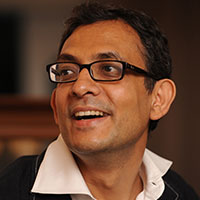Recent violent incidents in the country indicate a growing intolerance towards those whom we disagree with, as well as an unwillingness of politicians to defend the rights of people to speak and live as they wish. In this article, Abhijit Banerjee, Professor of Economics at MIT, contends that this is not just a Hindu problem or that of religion. There is a need for the political culture to imbibe our long intellectual tradition of liberal thought.
I was thinking of Gandhi. It was his birthday, and the horrible incident at Dadri had just happened.
What happened to Mohammed Ikhlaq and his family is obscene, but what is truly frightening is the subsequent public reaction. Many politicians have spoken — including those who seem to want to use this tragedy to provoke more violence against Muslims — but I have not heard anyone speak out to defend the rights of those who choose to eat beef.
Defending the rights of those we disagree with
Indeed the only one who even tries to articulate a moral position on this is Lalu Prasad, who, correctly in my view, protested the distinction between acceptable meats and other meats, but came to the rather unhelpful conclusion that all meat-eaters are uncivilised. For the rest, this is something that is a sign of the BJP's (Bharatiya Janata Party) depravity or a bad mark on the nation, but no one in politics seems to want to defend the right of beef-eaters to eat beef.
Gandhi would have. As he said in a prayer meeting in Delhi just weeks before Independence, when the idea of India was up for grabs and there was pressure from Rajendra Prasad and other conservatives to ban cow slaughter, "In
Gandhi gave up his life for saying things like that. Despite that, and the general adulation he is now regarded with (even the BJP is pro-Gandhi now), and our long intellectual tradition of liberal thought (that Amartya Sen has emphasised), the fundamental liberal principle of defending the rights of those who we disagree with has never really taken root in our political culture.
Opposition leaders have been quick to condemn the violence and even quicker to complain about the (political) motives of the instigators; the Prime Minister and the Union Finance Minister have expressed their dissatisfaction with such incidents because they undermine the country's development agenda. But no Hindu politician of any stature, and certainly no vegetarian politician with strong religious convictions,
Not just a Hindu problem, not just a religion problem
It's by no means just a Hindu problem. When was the last time a senior Muslim politician spoke up to defend the rights of his fellow musalmans1 to commit what some furious fanatic would call blasphemy?
Nor is it just a problem of religion, as Sudheendra Kulkarni recently found out. Offering a voice to someone from the other side, even if it is someone you potentially disagree with, has become tantamount to sponsoring his views. Kulkarni, a long-term BJP supporter, is now a ‘Pakistani agent'. In Maharashtra the mere mention of Shivaji's name without the appropriate amount of reverence gets you beaten up or banned.
And yet every time it happens, every time someone's right to speak and live as they wish is trampled upon by a mob, the reaction is predictably strategic. It becomes an occasion to attack the party that the perpetrators are most closely associated with; the party then either pushes back or tries to hush it up with murmurs of disapproval. No one takes to the streets to defend the right itself.
You can see why it does not happen. Suppose Modi were to speak out tomorrow in favour of protecting the right to eat beef (not that he has shown any inclination to…). The first reaction among his supporters would be incredulity — has he lost his mind…may be
Then the cynics will speak up — the Australians or the Americans must be paying him. Nobody will take it at face value because no one today does something like this — take a stand to emphasise a principle
Even saying a few generous words about one's opponents
This, I fear, is the way to become another Pakistan.
In that country, a minority of murderous ‘mullahs'2 have managed to take over the adjudication of who is a true
We might think we are very different from Pakistan but we are not; we are the same people, with the same capacity for warmth and passion and intolerance and violence. Dadri is
This article first appeared in Hindustan Times.
Notes:
- Musalman means Muslim.
- Mullah is a term used in the Muslim community for a religious leader.
- Ahmadiyas, Shias and Sufis are followers of different sects of Islam.




 26 October, 2015
26 October, 2015 




Comments will be held for moderation. Your contact information will not be made public.